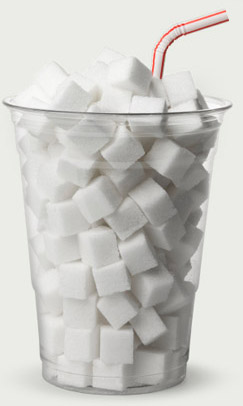
Cutting sugar consumption with kid-friendly soft drink alternatives
Posted in Nutrition on June 9, 2012. Last modified on March 26, 2019. Read disclaimer.
Childhood obesity in America has more than tripled in the past 30 years; and with this weight gain comes serious immediate and long-term health concerns: increased risk of heart disease and stroke, higher cholesterol levels, higher blood pressure, increased risk of diabetes, bone and joint problems, sleep issues, social repercussions, greater risk of osteoarthritis and even a greater likelihood of developing many types of cancer. Unfortunately, 1/3 of U.S. children are now overweight or obese.
While we often think of the types and amount of food we eat, our physical activity level and genetics as the most important weight factors, many studies suggest that there is "an association between obesity and consumption of soft drinks."
American consumption of soft drinks has increased by 500% over the past 50 years. Sodas (and to a lesser extent, sweetened juices and sports drinks) now account for 48% of the added sugars the average American child's diet.
Note 1: in addition to the calories that come directly from drinking soda, afterwards, rapidly falling blood sugar levels have been shown to stimulate appetite. So, we tend to eat more. This also may contribute to weight gain.
Note 2: Seventy-five percent of soft drinks consumed are the sweetened type. Diet sodas may be no better at helping a person to control their weight, however, since 1) "Increasing evidence suggests that artificial sweeteners do not activate the food reward pathways in the same fashion as natural sweeteners" so we end up with sugar cravings. 2) some people feel hungrier after consuming artificial sweeteners and 3) casual dieters may feel that drinking diet sodas gives freedom to go ahead and order dessert or eat richer foods.)
+ Free Shipping & Returns on Eligible Items.
(*Amazon's Top 100 list updated hourly.)
Note 3: With New York City proposing a ban on restaurant sale of soft drinks larger than 16 ounces, Coca-Cola took a different view of the correlation between sodas and obesity. Read Coke's response, in an interview with USA Today.
Walking a half-hour may not seem like a lot to burn off the calories consumed in a soda but 1) many children are drinking more than a single 12 ounce soda per day (1/3 of American 14-year old boys consume at least 36 ounces of soft drinks, as an example) and 2) that half hour walk burned only the calories consumed in the 12 ounce soft drink. We still have to use up all the other calories consumed during the day or your body will store these extra calories as fat and you will gain weight. (To get an idea of how many calories you're consuming in burgers, fries, toast with butter, juices and other foods, visit http://ndep.nih.gov/media/GP_FatCal.pdf)
So, if we are taking in more calories than our bodies need each day and sweetened soft drinks may be partially to blame, what are the alternatives?
Tips for cutting down on soft drink consumption
Regular water is, perhaps, the best alternative to sodas. There is no better thirst-quencher. Plus, water is healthy, free and contains no calories. Keep a bottle of chilled water with you and sip often, including with meals.
Other suggestions for reducing consumption of soft drinks include:
- Add a splash of flavor to water by adding a slice of lemon, cucumber or lime.
- Dilute juices with seltzer (or regular) water. Just like regular water, "fizzy" water has no calories.
- Drink skim milk. While a glass of whole milk contains 150 calories, that same glass of skim milk has only 86 calories. And, instead of empty calories, milk provides protein, calcium and vitamins needed by a child's growing body.
- Don't switch from sodas to fruit-flavored punch, sweetened tea or lemonade, sports drinks, energy drinks or gourmet coffees. All of these contain added sugar, may be high in caffeine, and almost always are low in nutrition.
- If you're going to drink soft drinks, drink smaller amounts and less often. If you're craving a soda, make it a single-size serving rather than "super-size." And, obviously, cutting down on the frequency helps, as well.
- Make healthy choices convenient. Do not keep soft drinks in your home. And keep sugar in the cupboard rather than on the counter or table.
- Drink unsweetened iced or herbal tea -- just don't add sweeteners like honey or sugar.
- Even though 100% fruit or vegetables have naturally occurring sugars, they at least contain nutrients. Just be sure to drink them sparingly.
- Read labels. Choose the beverage option with the lowest sugar and be aware that a single bottle often contains several servings per container.
Sources (Accessed June 9, 2012)
http://www.nyc.gov/html/doh/downloads/pdf/public/dohmhnews8-06.pdf
http://www.nhlbi.nih.gov/health/public/heart/obesity/phy_active_brief.pdf
http://nutrition.mcdonalds.com/nutritionexchange/nutritionfacts.pdf
http://www.ncdhhs.gov/dph/oralhealth/library/includes/ed-materials/Soft_Drinks_and_School_Age_Children.pdf
http://www.dhhs.nh.gov/dphs/nhp/adults/documents/hiddencalories.pdf
http://www.cdc.gov/healthyweight/calories/index.html
http://www.choosemyplate.gov/food-groups/downloads/MyPyramid_Food_Intake_Patterns.pdf
http://www.cdc.gov/healthyweight/healthy_eating/drinks.html
http://www.cdc.gov/healthyweight/calories/index.html
http://www.ncbi.nlm.nih.gov/pmc/articles/PMC2562148/
http://ndep.nih.gov/media/GP_FatCal.pdf
http://www.ncbi.nlm.nih.gov/pmc/articles/PMC1447263/
http://www.ncbi.nlm.nih.gov/pubmed/15707550
http://www.ncbi.nlm.nih.gov/pubmed/16385753
http://health.mo.gov/living/families/wic/wicfamilies/education/sugarbasics.php
http://www.cdc.gov/nchs/data/databriefs/db71.htm

 Exercise and your immune system
Exercise and your immune system Flesh-eating bacteria in Georgia river
Flesh-eating bacteria in Georgia river Flesh-eating bacteria infographic
Flesh-eating bacteria infographic How to control chronic inflammation
How to control chronic inflammation How to stop worrying
How to stop worrying Strength or endurance exercise?
Strength or endurance exercise? Controlling stress in the workplace
Controlling stress in the workplace Special nutritional needs of children
Special nutritional needs of children Healthy alternatives to soft drinks
Healthy alternatives to soft drinks Small space gardening
Small space gardening Preventing falls in the home
Preventing falls in the home Refreshing, fizzy fruit drink recipes
Refreshing, fizzy fruit drink recipes Ancient lessons for modern living
Ancient lessons for modern living